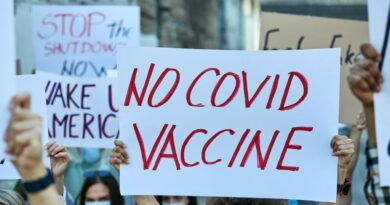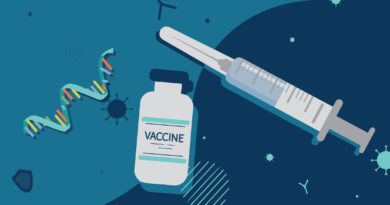Scottish woman develops severe and painful rashes all over her body immediately after getting AstraZeneca coronavirus vaccine

A woman from Scotland developed severely painful rashes all over her body after receiving the AstraZeneca Wuhan coronavirus (COVID-19) vaccine.
Leigh King, 41, a hairdresser from North Lanarkshire in Scotland, said her skin flared up almost immediately after she got her first dose of the Oxford-AstraZeneca vaccine on March 12. The rashes covered her face, chest, stomach, back, arms and legs. The rashes remained two weeks later and she’s still sore and in a lot of pain.
“My skin was so sore and constantly hot,” said King. “I have never felt pain like this… And to say it’s been the worst time of my life is an absolute understatement.”
King became eligible to get the AstraZeneca vaccine early because she acts as the sole caretaker of her autistic 13-year-old son. But because of the excruciating pain caused by the rashes, King said she has been unable to take care of her son. (Related: AstraZeneca coronavirus vaccine triggers immune response that can cause fatal blood clots in the brain.)
“I am a very healthy person and am not on any medication or anything like that,” said King during an interview with a local news outlet. “I am not even in a vulnerable category… [This is] a horrible feeling. Never in my life was I prepared for what I was about to experience.”
According to the Medicines and Healthcare products Regulatory Agency (MHRA), the British government’s top drug regulator, rashes are listed as an “uncommon” side-effect of the AstraZeneca vaccine. Recent data shows it should only affect one in every 100 people.
The British health authorities have received 3,795 cases of rashes as of press time.
Health officials are still trying to figure out why King developed the rashes. They think the rashes are either the result of an allergic reaction or of her immune system’s “overreaction” to the vaccine.
Some British dermatologists consulted by the National Health Service said that due to the hive-like nature of the rashes, it could have been triggered by “a number of other causes rather than the vaccine itself,” including food allergies, insect bites and cold exposure.
King unable to take care of her autistic son due to the intense rashes
On the day King received her AstraZeneca jab, she said she received a letter instructing her to seek medical assistance if the side effects she experienced persisted after two days.
She went to a nearby emergency department after two days as instructed, but was turned away.
“I went back twice more and the last time [I was turned away] I was in such pain I could barely walk out the hospital,” said King.
King said she is disappointed in the National Health Service (NHS), Britain’s publicly-funded and government-run healthcare system, because of the lack of follow-up care she has received for her special case. As of press time, King is still waiting to see a skin specialist regarding her condition. While she is waiting, her main concern has turned to the care of her son, Aidan.
“Aidan has also found this whole thing difficult. He is scared to come near me because of how my skin looks and he struggles to understand what is going on. At home is his happy place and I am his best pal, I got this vaccine to care for Aidan but I haven’t even been able to do that,” King said.
“This has just been such a tough situation, and has been so physically and mentally draining for the whole family. He is seeing a specialist in Glasgow soon and I won’t be able to be there for him. I can’t be there when he needs me most.”
The mother is confused by the many unanswered questions regarding her condition, and she wants people to be aware of the AstraZeneca vaccine’s potential side effects.
When pressed for comment, a spokesperson from the NHS said: “We are unable to discuss individual patient care and would ask the patient to contact us directly for their concerns.”
The NHS later put out a general statement saying that all of the vaccines approved by the MHRA have met the country’s “strict standards of safety, quality and effectiveness” and that the NHS stands by the usefulness of the AstraZeneca vaccine.
“So far, millions of people have been given a COVID-19 vaccine and reports of serious side effects, such as allergic reactions, have been very rare. No long-term complications have been reported.”
Learn more about the serious side effects that come from receiving a jab from the many coronavirus vaccines out there by reading the latest articles at Vaccines.news.
Sources include:


